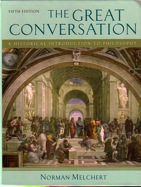Melchert's Philosophy Intro Updated

[Aside: You know it must be a great thing to write a standard textbook since one can release a new edition every few years and circumvent all the sales from the campus used book stores
From the OUP Description:
Now in its fifth edition, this historically organized introductory text treats philosophy as a dramatic and continuous story--a conversation about humankind's deepest and most persistent concerns. Tracing the exchange of ideas between history's key philosophers, The Great Conversation: A Historical Introduction to Philosophy , Fifth Edition, demonstrates that while constructing an argument or making a claim, one philosopher almost always has others in mind. The book addresses the fundamental questions of human life: Who are we? What can we know? How should we live? and What sort of reality do we inhabit?
The fifth edition retains the distinctive feature of previous editions: author Norman Melchert provides a generous selection of excerpts from major philosophical works and makes them more easily understandable to students with his lucid and engaging explanations. Ranging from the Pre-Socratics to Derrida and Quine, the selections are organized historically and include four complete works: Plato's Euthyphro, Apology, and Crito, and Descartes' Meditations on First Philosophy. The author's commentary offers a rich intellectual and cultural context for the philosophical ideas conveyed in the excerpts. Extensive cross-referencing shows students how philosophers respond appreciatively or critically to the thoughts of other philosophers. The text is enhanced by two types of exercises--"Basic Questions" and "For Further Thought"--and more than sixty illustrations.
What's new to the 5th edition?
- A new chapter (25) on Simone de Beauvoir and her contributions to philosophy
- New material on Buddhist, Muslim, and Jewish thinkers, including profiles of the Buddha, Avicenna (Ibn Sina), Averroës (Ibn Rushd), and Maimonides (Moses ben Maimon)
- A new profile of Jean-Jacques Rousseau
- Improved translations of several of Plato's works, including Protagoras, Gorgias, Phaedo, Symposium, Meno, and the Republic
- Review questions that are now dispersed throughout the chapters (instead of at chapter ends) to follow relevant passages and facilitate classroom discussion
- Thirteen new images, including seven explanatory cartoons that help students understand key concepts
- A revised Instructor's Manual and Test Bank containing essential points, teaching suggestions, and multiple-choice, short-answer, and essay exam questions
I also appreciate Melchert's respectful treatment of religious subjects. His chapter on Christianity and the meaning of Jesus is quite good, although short. He also gives serious treatment to other Christian thinkers such as Augustine, Aquinas, the Reformers and more in the context of the times in which they lived.
Finally, I've found value in this book that it is not only an introduction to philosophy but serves as a philosophy reader as well. Melchert includes extremely generous excerpts (sometimes numerous excerpts) from philosophers including some complete works as referred to in the OUP description above.
Although written for college level philosophy intro classes, I've recommended this book to others as well who are interested in dipping their toes in philosophy and want something more than Philosophy for Dummies. The book's a bit pricey new, so if you're interested, watch the used market closely. If you want a 5th edition, make sure that is what you are getting before you place your order with 3rd party sellers. Speaking of which, I wonder what I can get for my 4th edition now that it's out of date?









